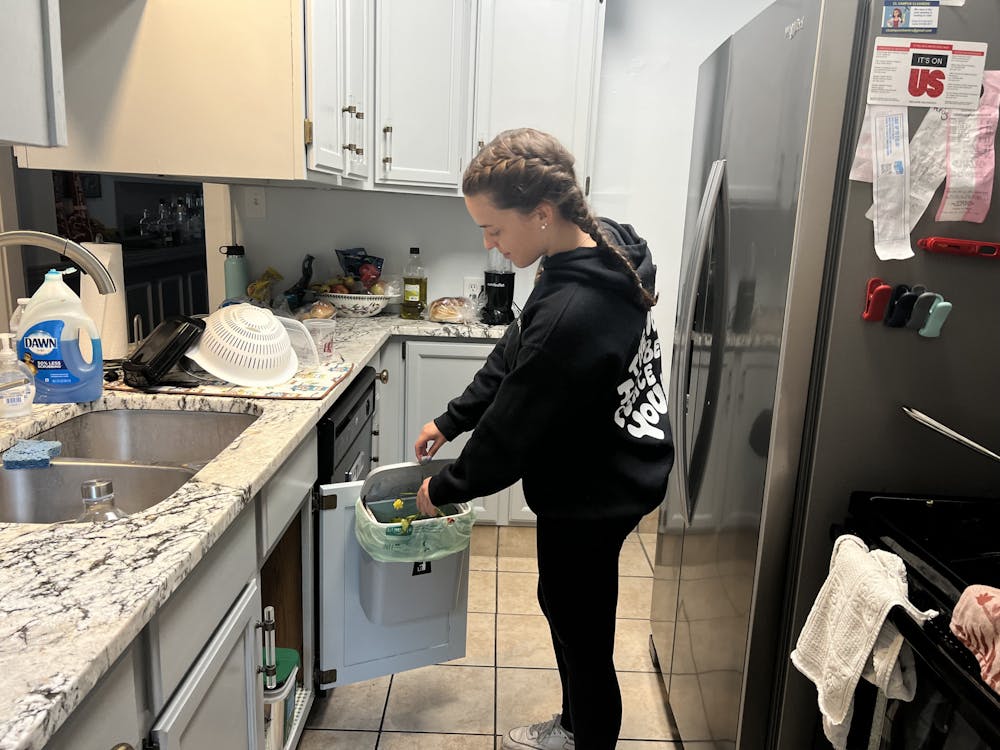As I get off I-275 to make my way back to Oxford the light turns green, and with the curve of the road, a giant hill ominously approaches on my right. Birds circle overhead, and a repugnant odor covers the area, causing me to jab the recirculation button on my dashboard.
It’s a trash hill producing an odor stemming from all of the trash that I have produced at Miami, along with 6,000 other tons of material that enters the landfill every year.
This year, I started collecting organic waste at my college house of six girls. As I dealt with our heap of avocado skins, soggy lettuce and leftover rice every week, I began to question, why am I actually doing this? Composting efforts seem to be an upward trend at Miami and in cities across the US, but why does it matter? Wouldn’t organic waste just decompose in a landfill anyways?
With these questions in mind, I spoke with Dave Treleaven, the environmental specialist for the City of Oxford, who enlightened me on organic waste, Oxford's new efforts to deal with it, and why they matter.
“Rumpke takes in over 6,000 tons [of waste] per day. Just to give you a point of reference, Oxford's total solid waste and recycling is about 6,000 tons per year,” Treleaven explained.
According to Oxford’s website, one-third of the material in these landfills is compostable.
In 2019, Oxford City Council initiated a food scrap drop-off program consisting of six containers on South Main Street provided by a non-profit called Go-Zero. Available 24/7 and only a couple blocks away from Uptown, the containers are an accessible and free way to dispose of organic waste. Still, it can feel like a chore going through the trouble for some banana peels and egg shells.
“Once the oxygen around the organic trash has been depleted, the decomposition goes to the anaerobic decomposition, which creates the methane,” Treleaven said. “And with methane being 25 times more warming than carbon dioxide, the reduction of methane is a good thing.”
In lay terms, when organic material is buried in a landfill, it quickly loses access to oxygen and resorts to a new process of breaking down matter which produces methane, a harmful greenhouse gas. Composting, however, uses the help of microorganisms supported by oxygen to break down the organic matter and significantly reduces methane emissions.
A more intuitive reason for composting is that it adds years to the lifespan of a landfill.
“The longer we can keep the sanitary landfill in operation without being filled up, is that much longer before another landfill has to be created,” Treleaven said.
Recycling your food scraps could prevent another landfill from being built down the road, a plan which is in the works. Rumpke received permission from the Ohio EPA to expand on the north side of the I-275 outer belt.
Enjoy what you're reading?
Signup for our newsletter
In addition to concern over local aesthetics, fundamentally, we should dispose of our food in a way which protects the very earth that is producing it for us.
Taking responsibility for your organic waste through composting can directly reduce emissions, and is relatively easy, yet it often gets dismissed for the odor, hassle, and unwillingness to make a lifestyle change. If the proper steps are taken, it is easy to combat sanitary concerns and compost effectively.
Next time, I’ll discuss how I collect food waste in a college house and how it can be integrated into your lifestyle. Have tips, questions or comments? Send me an email to engage in Oxford’s composting journey.
Ava Kalina is a fourth-year student studying Diplomacy & Global Politics and Data Analytics while pursuing her certificate in Geographic Information Systems and a minor in French. She is passionate about finding practical sustainable solutions to share with students.




